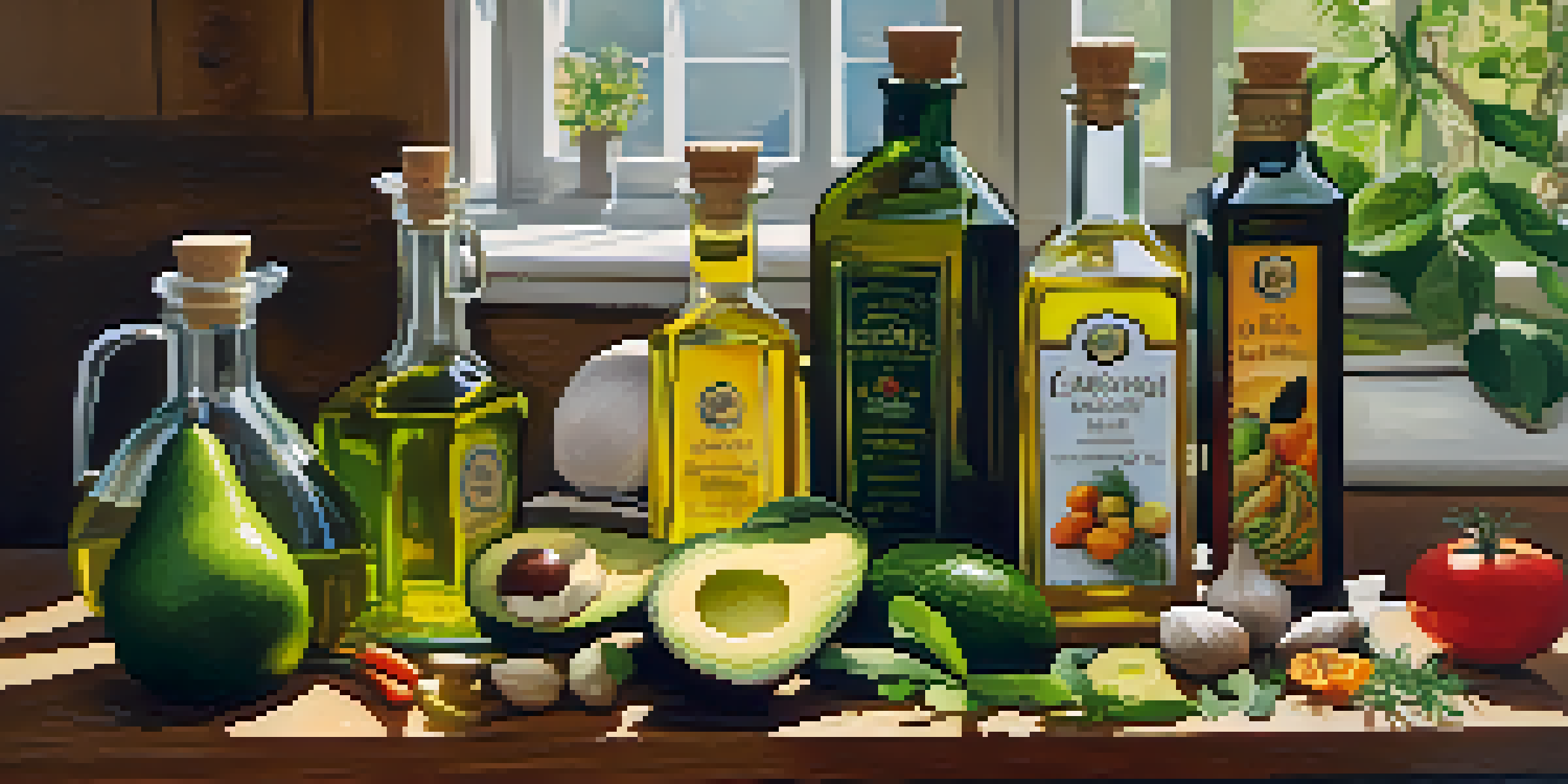Exploring Vegan Cooking Oils: A Comprehensive Guide

Understanding the Basics of Cooking Oils
Cooking oils are essential in any kitchen, serving as the foundation for many dishes. They not only add flavor but also contribute to the texture and overall mouthfeel of the food. When it comes to vegan cooking, selecting the right oil can enhance your meals while providing various health benefits.
Cooking is like love. It should be entered into with abandon or not at all.
Each type of oil has its unique properties, smoke points, and nutritional profiles. For instance, oils high in unsaturated fats are generally considered healthier than those high in saturated fats. Understanding these basics can help you make informed choices that align with your dietary preferences.
Moreover, the versatility of cooking oils extends beyond frying and sautéing. They can be used in dressings, marinades, and even baking. By exploring different oils, you can bring a whole new dimension of flavor to your vegan dishes.
Olive Oil: The Mediterranean Marvel
Olive oil is often hailed as a staple in vegan cooking, especially for those who appreciate Mediterranean cuisine. Rich in monounsaturated fats and antioxidants, it offers numerous health benefits, including heart health support. Its robust flavor makes it ideal for drizzling over salads or using in marinades.

When cooking with olive oil, it's essential to consider its smoke point, which is around 375°F for extra virgin olive oil. This means it’s best suited for medium-heat cooking rather than high-temperature frying. However, its versatility shines in cold dishes, where it can truly showcase its flavor.
Diverse Oils Enhance Vegan Dishes
Exploring various cooking oils can elevate flavors and textures in vegan meals.
Additionally, choosing high-quality extra virgin olive oil can make a significant difference in taste. Look for oils labeled with a harvest date and a region of origin to ensure you're getting the freshest product possible.
Coconut Oil: The Tropical Delight
Coconut oil has gained popularity in vegan cooking for its unique flavor and health benefits. High in medium-chain triglycerides (MCTs), it may provide quick energy and support metabolism. Its tropical aroma can transport your dishes to far-off places, making it a fun addition to various recipes.
Good food is the foundation of genuine happiness.
This oil has a higher smoke point, around 350°F for unrefined coconut oil, making it suitable for baking, sautéing, and even frying. Its solid state at room temperature can also be helpful when creating vegan desserts, as it can mimic the texture of butter in recipes.
However, moderation is key, as coconut oil is high in saturated fat. Balancing it with other healthier oils can help you maintain a well-rounded diet while enjoying its rich flavor.
Avocado Oil: The Healthy Alternative
Avocado oil is another fantastic option for vegan cooking, known for its high smoke point of around 520°F. This makes it perfect for high-heat methods like grilling and frying, allowing you to explore various cooking techniques without compromising the oil's integrity. Plus, it’s rich in monounsaturated fats and vitamins E and K.
The subtle flavor of avocado oil can enhance dishes without overpowering them, making it ideal for salad dressings, marinades, and even drizzling over finished dishes. Its versatility makes it a great all-purpose oil in the kitchen.
Health Benefits of Cooking Oils
Different oils provide unique nutritional advantages, such as heart health and anti-inflammatory properties.
As with any oil, it's essential to choose high-quality avocado oil, preferably cold-pressed and organic, to ensure you’re maximizing both flavor and nutritional benefits. This way, you can enjoy its creamy richness in your vegan meals.
Flaxseed Oil: A Nutritional Powerhouse
Flaxseed oil is a unique addition to the vegan oil lineup, celebrated for its high omega-3 fatty acid content. These essential fats are crucial for heart health and may help reduce inflammation. Incorporating flaxseed oil into your diet can provide substantial nutritional benefits, especially for those following a plant-based lifestyle.
However, flaxseed oil is not suitable for cooking due to its low smoke point. Instead, it works best when used in cold dishes, such as salad dressings or smoothies. Adding just a tablespoon can elevate the nutritional profile of your meals without altering their flavors drastically.
When using flaxseed oil, remember to store it in the refrigerator to maintain its freshness and prevent oxidation. This simple step ensures you reap all the health benefits it offers while keeping your meals vibrant and nutritious.
Sesame Oil: The Flavor Booster
Sesame oil is a beloved staple in many Asian cuisines and can add a fantastic depth of flavor to your vegan dishes. It comes in two varieties: light sesame oil, which is suitable for cooking, and toasted sesame oil, which is used primarily as a finishing oil due to its intense flavor. Both types bring unique tastes that can transform a simple meal into something extraordinary.
With a smoke point of about 410°F for light sesame oil, it’s great for stir-frying and sautéing. On the other hand, toasted sesame oil is perfect for drizzling over cooked dishes, giving them a nutty aroma that enhances their overall appeal.
Choose Oils Based on Cooking Needs
Selecting oils according to cooking methods and desired flavors is key to achieving optimal results in the kitchen.
Incorporating sesame oil into your cooking can also provide additional health benefits, including antioxidants and anti-inflammatory properties. This makes it a flavorful and nutritious choice for any vegan kitchen.
Sunflower Oil: The Versatile Choice
Sunflower oil is a commonly used cooking oil that’s both accessible and versatile. With a high smoke point of around 440°F, it’s perfect for frying, baking, and roasting. It has a mild flavor, allowing the natural tastes of your ingredients to shine while providing a reliable cooking medium.
Rich in vitamin E and low in saturated fat, sunflower oil is a heart-healthy option that can easily fit into a vegan diet. It works well in dressings, marinades, and even homemade vegan mayonnaise, making it a great all-around choice.

When selecting sunflower oil, look for high-oleic varieties, which have higher monounsaturated fat content and better stability. This ensures not only better flavor but also maximizes the health benefits of your cooking.
Choosing the Right Oil for Your Dishes
Selecting the right cooking oil is crucial for achieving the best flavor and health benefits in your vegan meals. Consider the cooking method, desired flavor profile, and nutritional content when making your choice. For instance, if you're frying, oils with higher smoke points like avocado or sunflower oil are ideal.
In contrast, for salad dressings or drizzling over cooked dishes, oils like extra virgin olive oil or toasted sesame oil can elevate the flavors beautifully. Balancing different oils in your cooking can add variety and excitement to your meals.
Ultimately, experimenting with different oils can lead to discovering new tastes and textures in your cooking. Embrace the diversity of vegan cooking oils to create delicious and healthful dishes that everyone will enjoy.